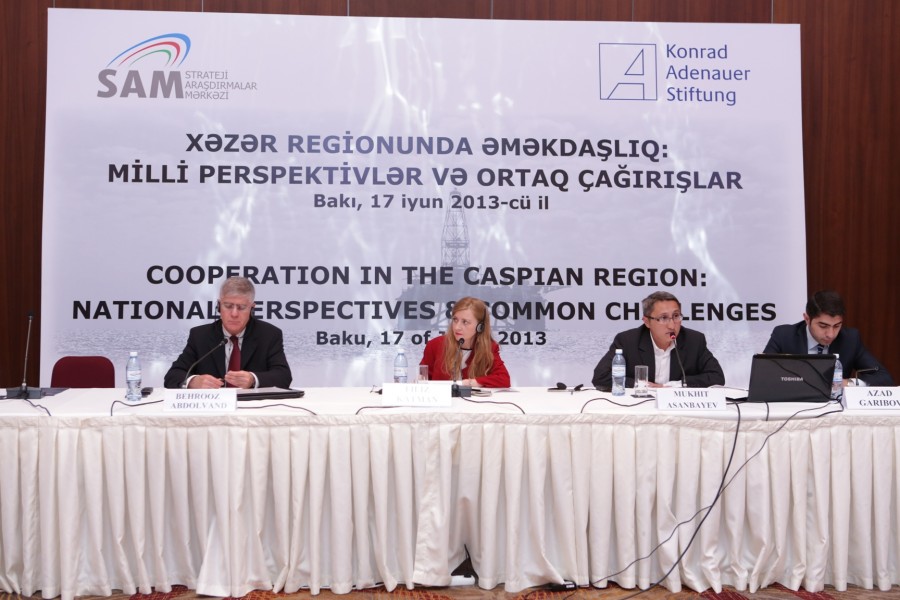Cooperation in Caspian region discussed in Baku

By Nigar Orujova
The Center for Strategic Studies (SAM) under the President of Azerbaijan hosted a conference, "Cooperation in the Caspian region: national prospects and common challenges", in Baku on June 17.
The event was organized by SAM and the German Konrad Adenauer Foundation.
Addressing the event, SAM Director Farhad Mammadov said that the Caspian region is very important for Azerbaijan from a strategic point of view. According to him, historically Azerbaijan has closely cooperated with the other littoral countries and implemented all projects primarily in accordance with national interests, and then with the interests of the Caspian states.
Moreover, Mammadov said that the biggest threat to the Caspian Sea is its militarization. The legal status of the Caspian Sea has not yet been determined, however, the coastal countries can cooperate based on bilateral agreements.
"After listening to the experts at the conference, we will be able to understand each other better and thus be able to resolve discrepancies," Mammadov said.
Canan Atilgan, Regional Program Director at the Konrad Adenauer Foundation, said one of the main purposes of the event is to enhance the links between various think tanks. Atilgan expressed hope that the conference will help to outline future steps for cooperation in the Caspian Sea.
Atilgan informed the participants about the activities of the Foundation in the South Caucasus and noted that the European Union should play an active role in the development of the region and in the support of economic diversification.
"Regional development and security is very important for Europe. The Caspian countries follow the path of European integration through various projects," Atilgan said.
Behrooz Abdolvand, Coordinator of the Berlin Centre for Caspian Region Studies, pointed out that Azerbaijan plays a great role in the diversification of energy supplies to the EU.
"There is a need for an alternative to Russian gas supplied to Europe. The EU hopes that Azerbaijan will diversify energy supplies to Europe," he said.
Head of the Center for Social and Humanitarian Studies of Kazakhstan, Muhit Asanbayev, researcher of the Center for Strategic Studies of Azerbaijan Azad Garimov and others also spoke at the event.
The conference featured two panels, including "Dynamics of cooperation in the Caspian region: trade and transportation" and "Strategies and structures of security in the Caspian region: national prospects, regional cooperation and the role of external players".
In April, the heads of delegations presented their countries' positions on key elements of the legal status of the Caspian Sea and various aspects of maritime cooperation during the 32nd meeting of the Special Working Group on the Convention in Tehran.
In July 1998, Russia and Kazakhstan signed an agreement on the delimitation of the northern part of the Caspian Sea.
On November 29, 2001 and February 27, 2003, Kazakhstan and Azerbaijan signed an agreement on the delimitation of the Caspian Sea.
Kazakhstan, Azerbaijan and Russia signed an agreement on the delimitation of adjacent sections of the Caspian on May 14, 2003.
Here we are to serve you with news right now. It does not cost much, but worth your attention.
Choose to support open, independent, quality journalism and subscribe on a monthly basis.
By subscribing to our online newspaper, you can have full digital access to all news, analysis, and much more.
You can also follow AzerNEWS on Twitter @AzerNewsAz or Facebook @AzerNewsNewspaper
Thank you!
